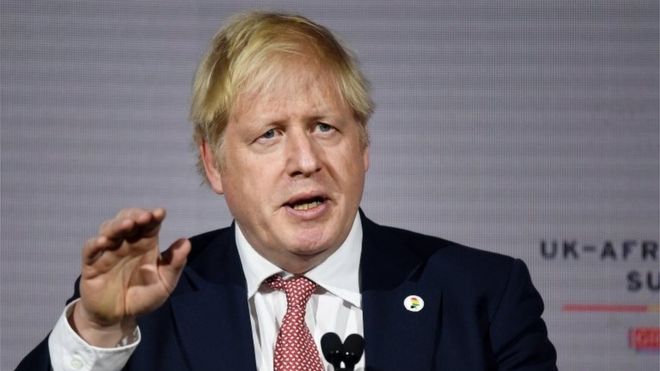-
 play_arrow
play_arrow
BayRadio Listen Live Broadcasting in Spain


The UK’s post-Brexit immigration system will put “people before passports”, Boris Johnson has said.
Speaking at the UK-Africa Investment Summit, the PM said immigration would become “fairer… treating people the same wherever they come from”.
Freedom of movement between the UK and EU is expected to end after the Brexit transition period on 31 December 2020.
The government says it will introduce an Australian-style points based system by January 2021.
Under this system those wanting to work in the UK could be assigned points based on a number of professional and personal characteristics such as education levels.
Currently, under freedom of movement, EU citizens do not need a visa to work in the UK, but immigrants from outside the EU are subject to a points system based on English language skills, being sponsored by a company and meeting a salary threshold.
Speaking in London, the prime minister said post-Brexit the UK’s immigration system would become “more equal”.
“By putting people before passports we will be able to attract the best talent from around the world, wherever they may be,” he said.
All the main parties are largely behind the idea of a skills-based system.
The question here is whether or not the government wants to come up with some kind of control – to put a cap over the top of it.
We don’t know yet what the government’s real position is – it’s only got 11 months to find out.
In the coming weeks, the government’s main advisory body is going to report back on some of these questions.
It is only then we’ll have some answers about what the PM’s direction of travel is.

Speaking at the summit, Mr Johnson sought to encourage investment in the UK describing the country as a “one-stop shop for the ambitious growing international economy”.
He also promised the UK would no longer provide “any new direct official development assistance, investment, export credit or trade promotion for thermal coal mining or coal power plants overseas”.
“Not another penny of UK taxpayers’ money will be directly invested in digging up coal or burning it for electricity,” he said.
“There’s no point in the UK reducing the amount of coal we burn if we then trundle over to Africa and line our pockets by encouraging African states to use more of it,” he said.
“Instead we are going to focus on supporting the transition to lower and zero carbon alternatives.”
According to the Department for International Development, the UK has not provided bilateral official development assistance for coal-fire power generation and coal mining since 2012.
It says that in the future direct support for thermal coal mining and coal-fired power plants from the Department for International Trade will be stopped and refocused on other activity.
Commenting on the government’s UK-Africa Investment Summit, shadow international development minister Preet Kaur Gill said: “The Conservatives will continue to misuse the country’s aid budget to prop up the needs of business elites rather than spend it on tackling global poverty, inequality and the climate crisis.
“Trade and investment deals are not a panacea for ending poverty, especially when they’re written in line with the demands of big business, and don’t have safeguards in place to protect public services or ensure the most marginalised groups aren’t left behind.”
Written by: BayRadio News
Similar posts
Recent Posts
- Robotic Surgery for Prostate Cancer: What Is Radical Prostatectomy and How Does the Da Vinci Robot Improve It
- What Is Fibromyalgia? Symptoms and Treatments of an Invisible Illness That Requires Specialized Attention
- AMASVISTA Glass: 10 reasons to choose SUNFLEX glass curtains
- Robotic Surgery, Immunotherapy and Comprehensive Care Take Centre Stage at Pancreatic Cancer Conference at Quirónsalud Torrevieja
- Robotic Surgery Against Ovarian Cancer: Greater Precision, Less Pain and Faster Recovery

Ctra. Cabo La Nao, CC La Nao, Local 6 03730 Javea, Alicante, Spain
Advertise with us
Do you have a business in Spain? Do you provide a service to the expat community in Spain? Would you like your message to reach over 500.000 people on a weekly basis?
BayRadio is a community orientated radio station offering fantastic content to our many listeners and followers across our various platforms. Contact us now and find out what Bay can do for you!
Our business is helping your business grow.
BAY RADIO S.L. © 2024. ALL RIGHTS RESERVED. WEB DESIGN BY MEDIANIC







